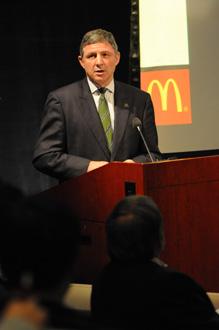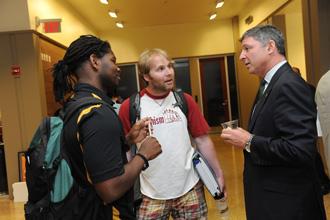McDonald’s exec describes chain’s revitalization
If you’re like most people, you probably don’t remember McDonald’s short-lived experiment with 55-cent Big Macs, but to Neil Golden, chief marketing officer of McDonald’s USA, the ill-fated 1997 promotion is a bitter reminder of everything that had gone wrong at the Golden Arches.

The campaign started with a simple premise—to drive sales with 55-cent hamburgers and cheeseburgers—but two weeks before its launch, executives on the financial side of the company changed the offer, adding the Big Mac to the promotion but with the stipulation that customers had to buy fries and a drink to get the special price. Customers were confused by the complicated purchase requirements, and franchisees were frustrated by the promotion’s dismal sales. The campaign was scrapped after less than two months, and the company’s stock began a long slide, eventually bottoming out at around $12 a share.
“What could have been an enduring, long-term brand- and business-building idea turned into a period of chaos,” said Golden, a 21-year veteran of the company. “It was a dark time, but this type of a brand crisis allowed us to make some radical changes.”
Golden discussed those changes and how they helped to revitalize the McDonald’s brand as this year’s R.W. Freeman Distinguished Lecturer. His presentation, titled “Building Brand Trust,” took place at the Freeman School on April 4.
One of McDonald’s key principles had always been staying focused on consumers, Golden said, but in the ’90s the company began to stray from that principle in favor of an aggressive expansion strategy.
“We were determined to grow bigger by adding more restaurants as opposed to satisfying customers’ needs,” said Golden. “At the end of the day, customers’ tastes were changing and we weren’t. We weren’t paying attention.”
In 2003, McDonald’s unveiled “Plan to Win,” a new business strategy that put the company’s focus squarely back on consumers. As part of that strategy, the company remodeled restaurants, expanded operating hours, improved the ordering process and introduced of a wide range of new and health-conscious menu items including premium salads, gourmet coffees, wraps, smoothies and oatmeal.
“We made a conscious statement that we’re going to grow the business by being better, not just by being bigger,” Golden said. “We quickly got back on track with how customers’ tastes have evolved, and we started to satisfy them in significantly different ways than what we had been doing.”

Since implementing Plan to Win, company revenues have grown by $7.9 billion, same store sales have increased for eight straight years and the company’s stock price has jumped more than 450 percent. According to Interbrand, the global branding consultancy, McDonald’s is now the sixth-most-valuable brand in the world.
Despite that success, the company still has many detractors. McDonald’s is a frequent target of health advocates who blame the restaurant for contributing to the nation’s obesity epidemic, but Golden—who stands 5 feet 11 inches, weighs 200 pounds and eats at McDonald’s 10 times a week—flatly denies that accusation.
“Number one, portion sizes have changed dramatically, and I believe exercise is a huge factor,” Golden said. “If anybody wants to suggest that McDonald’s is causing obesity, I will proudly say absolutely no way. Now people have to make good choices, and we provide incredible choices.”
Interested in advancing your education and/or career? Learn more about Freeman’s wide range of graduate and undergraduate programs. Find the right program for you.
Other Related Articles
- Forbes: 4 Remedies For Reducing Generative AI Mediocrity
- Research Notes: Shuhua Sun
- Research Notes: Alissa Bilfield
- Quartz: Companies that replace workers with AI ‘risk mediocrity,’ expert warns
- BBC News: ChatGPT will soon allow erotica for verified adults, says OpenAI boss
- Embracing Business Futurism: A Conversation with Cliff Farrah
- Freeman Futurist Series explores innovation, leadership and emerging technologies
- OHSonline: From the Battlefield to the Workplace - How Staff Rides Improve Safety Decision Making
